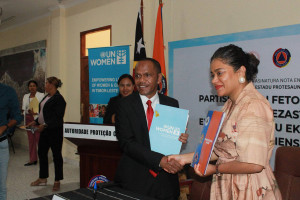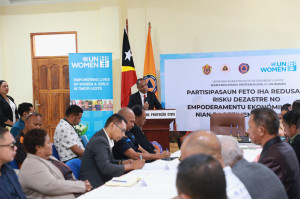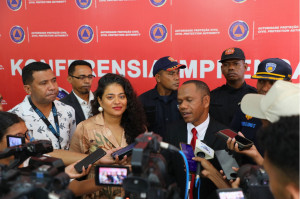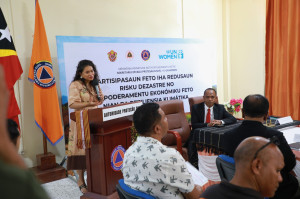On September 20th, 2024, the Secretary of State for Civil Protection, Domingos Mariano Reis, signed a Memorandum of Understanding with UN Women to promote greater participation and leadership by women in Disaster Risk Reduction and climate resilience. 
The agreement, which will be implemented over three years, from 2024 to 2027, covers the execution of projects in the municipalities of Viqueque, Covalima and Ermera, focusing on natural disaster risk prevention and mitigation initiatives. Under this memorandum, the Government of Timor-Leste and UN Women will work closely together to integrate gender perspectives into national disaster management policies and climate planning. 
In his speech, the Secretary of State, Domingos Mariano Reis, highlighted the importance of this agreement and assumed that “during [his] mandate in the 9th Constitutional Government, [he will] prioritize the prevention and mitigation of natural disaster risks, which have a direct impact on the economic growth of families. These disaster risk education actions are essential to increase women’s knowledge of how to protect themselves and their families.” 
The Secretary of State also stressed the need to mobilize all available resources to ensure effective preparation and an adequate response to disasters, emphasizing the importance of women knowing the causes of disasters, their warning signs and ways of preventing and acting. 
Amy Nishtha Satyam, Head of UN Women in Timor-Leste, highlighted the relevance of this partnership, stating that “women are not only vulnerable in disaster situations, but can also be agents of change”. Through this memorandum, UN Women, in collaboration with the Secretary of State for Civil Protection, will focus on developing information resources and training programs to ensure that women are at the forefront of disaster risk reduction and climate resilience.
The overall objective of the Memorandum of Understanding is to promote greater participation and leadership of women in disaster risk reduction and climate resilience, contributing to the sustainability of livelihoods. Specific objectives include advancing gender equality and women’s empowerment through gender-sensitive practices in disaster management, strengthening rural women as key actors in decision-making on climate resilience and disaster risk reduction, increasing rural women’s access to natural resources such as land and drinking water, and promoting a gendered approach in the allocation of financial resources related to disasters and climate change.